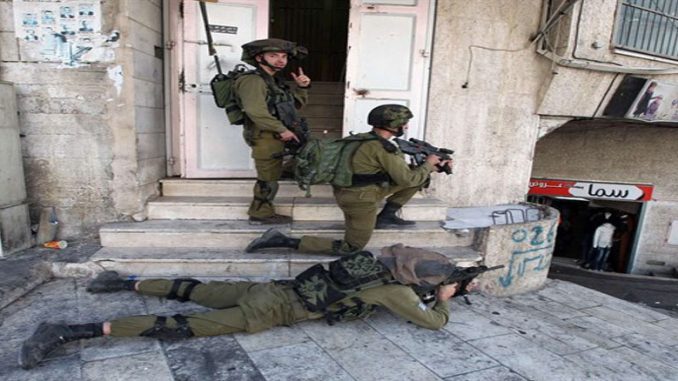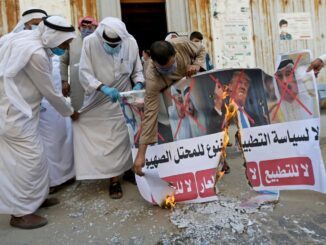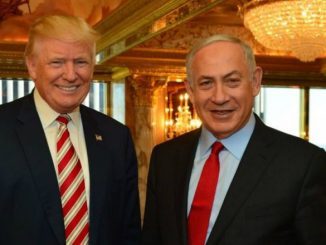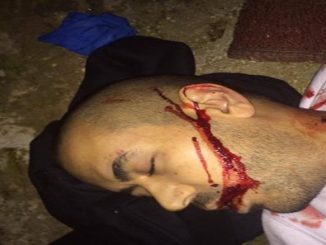
Israeli and Palestinian human rights organizations released statements this week condemning the use of excessive force by Israeli forces against Palestinians, particularly Palestinian protesters, which in many cases, result in death.
Israeli human rights group B’Tselem released a statement Monday highlighting the case of Saba Abu Ubeid, a 22-year-old Palestinian from the central occupied West Bank district of Salfit, who was shot dead by Israeli forces last month during a protests in the Ramallah-area village of Nabi Saleh.
B’Tselem described the scene that day as “minor confrontations” between armed Israeli forces, who fired tear gas and rubber-coated steel bullets at about one hundred peaceful demonstrators, consisting of Palestinians from Nabi Saleh and from nearby villages, Israelis, and foreign nationals.
According to the group, only ten to fifteen young Palestinian men were throwing stones at Israeli forces, who fired at the protester with rubber and sponge-tipped bullets, injuring one in the head with a sponge-tipped round and the other in the thigh with a rubber-coated steel bullet.
Despite the relatively small number of stone-throwers, who were located about 100 meters from the soldiers, “several demonstrators overheard the commanding (Israeli) officer, who was standing close to the main group of protesters, order two snipers armed with Ruger rifles to advance towards the stone-throwers and open fire,” B’Tselem said.
“Three soldiers, one of them a sniper, stationed themselves behind a semi-completed house on the eastern slopes of the hill. The sniper intermittently fired live (0.22-inch) bullets at the stone-throwers, who were hiding behind the ruins of a house some 100 meters away,” B’Tselem said, highlighting that Ubeid was shot by the sniper in the waist as his back was turned, running away from the soldiers.
“The unlawful, unjustifiable and lethal shooting and the harsh abuse described above did not take place in a vacuum,” B’Tselem said.
The group noted that that the 0.22-inch caliber bullet — also known as “tutu bullets” — fired at Ubeid is a type of live ammunition, and that the “open-fire regulations permit lethal measures only when facing mortal danger and only as a last resort.”
“Nonetheless, in the Occupied (Palestinian) Territories, Israeli soldiers routinely use lethal measures – including live ammunition – against demonstrators who do not pose mortal danger,” B’Tselem said, highlighting that since January 2015, 42 Palestinians have been killed by Israeli forces using lethal measures while demonstrating or throwing stones, and that B’Tselem investigations have found that “at least 35 of them posed no mortal danger to Israeli security personnel.”
The Israeli soldiers who shot and killed Ubeid “knew that, just as in many other cases, they would not be held accountable for their actions,” B’Tselem said.
Meanwhile, the Gaza-based al-Mezan Center for Human Rights released a statement Sunday condemning the continued targeting of civilians and excessive use of force against Palestinian protesters in Gaza, specifically in the case of 35-year-old Ayed Khamis Jumaa who was shot dead during clashes along the Gaza border on June 9, just days after a 25-year-old Palestinian was shot and killed under similar circumstances in Gaza.
As of May 19, al-Mezan noted that in addition to two deaths, at least 52 Palestinians, including eight children, have been injured during clashes in Gaza.
According to al-Mezan, during the same clashes in which Jumaa was shot in the head and killed, 19 other Palestinians were injured.
In 2016, seven Palestinians were killed by Israeli forces in the Gaza Strip, when 18 Palestinians were shot and killed by Israeli forces during clashes across the occupied Palestinian territory — out of more than 100 Palestinians to be killed by Israelis over the course of the year, according to Ma’an documentation.
“Al Mezan strongly condemns attacks against civilians in the occupied Palestinian territory and asserts that Israeli practices represent grave and systematic violations of International Humanitarian Law,” the statement said.
The group called on the international community “to uphold their legal obligations under international law to provide protection for civilians, and to implement concrete steps that would realize the Palestinian people’s right to self-determination.
“The failure to act and the silence of the international community about Israel’s violations has further encouraged the Israeli government, forces, and authorities to perpetuate policies and practices that constitute violations of international law,” the group said.
In March, B’Tselem released a report slamming Israeli forces’ “profound disregard” for the life of 17-year-old Qusay al-Umour, who was shot dead in January during clashes in the southern occupied West Bank village of Tuqu, calling his killing “unjustified and unlawful.”
B’Tselem highlighted at the time that al-Umour was also shot with 0.22 inch caliber bullets.
Following al-Umour’s death, Palestinian legal NGO BADIL also concluded that “whether he was throwing stones at the soldiers or not, al-Umour could not have presented a lethal threat to the well-protected Israeli border police from a distance of around 100 meters, and the use of live ammunition against him was therefore unjustified.”
In dozens of cases, Israel’s version of events has been disputed by witnesses, activists, and rights groups who have denounced what they have termed a “shoot-to-kill” policy against Palestinians who did not constitute a threat at the time of their death, or who could have been subdued in a non-lethal manner — amid a backdrop of impunity for Israelis who committed the killings.
Though the Israeli army and military police opened an official investigation into al-Umour’s death, the precedent set by cases such as that of 15-year-old Khalid Bahr, who was shot dead by Israeli forces in October for allegedly throwing rocks at soldiers during a raid in a Hebron-area village, casts doubts on the likelihood of real accountability.
According to rights group Yesh Din, of 186 criminal investigations into suspected offenses against Palestinians opened by the Israeli army in 2015, just four resulted in indictments.



